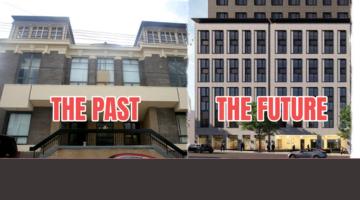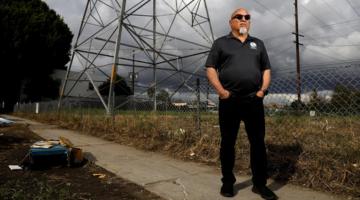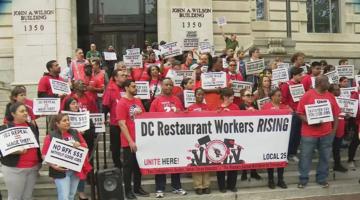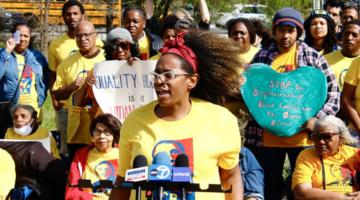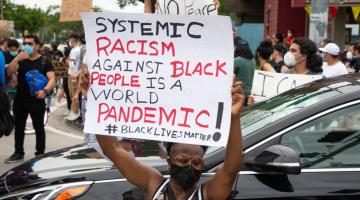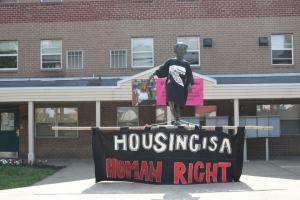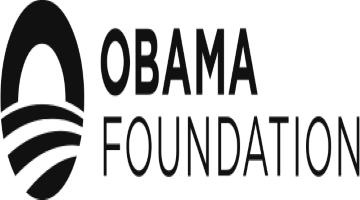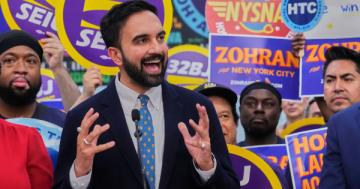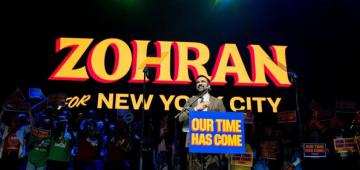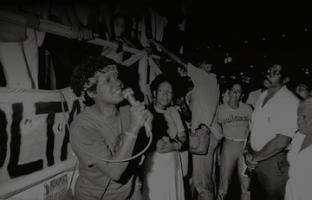A dynamic new community project has been launched to halt the push-out of Black and brown people from Oakland by taking land and housing out of the speculative market.
“We’re Black, indigenous, and other people of color trying to reclaim land sovereignty without capitalist exploitation.”
Housing is a national crisis due to speculative investment and gentrification. I spoke to Noni Session, Executive Director of the Oakland-based East Bay Permanent Real Estate Cooperative(EBPREC), about solutions. This is the cooperative’s mission statement:
EBPREC is: A movement based, investor crowd-funded, multi-land holding entity through which Black, Indigenous, People of Color, and allied communities can cooperatively organize, finance, purchase, occupy, and steward properties, taking them permanently off the speculative market.
By co-creating community controlled assets, and thereby reducing risk of displacement, we help people meet their basic social, economic, and emotional needs and empower them to cooperatively lead a just transition from an extractive capitalist system into one where communities are ecologically, emotionally, spiritually, culturally, and economically restorative and regenerative.
Ann Garrison: Thanks for making time for this conversation, Noni, even though your launch party for the East Bay Permanent Real Estate Cooperative is tomorrow, December 5.
Noni Session: Glad to. Sorry I couldn’t write it myself, but I'm an academic. We have to work ourselves up into a flurry to write, and all my attention is on launching the cooperative right now.
AG: I had a feeling you had some academic or literary background because you express your goals so lyrically and precisely on your website that it gave me chills.
I should add that much academic writing is turgid and politically constrained, so what I’m really saying is that it’s obvious you’ve had the opportunity to give this a lot of thought and made good use of it. What is your academic background?
NS: I did my doctoral work at Cornell in anthropology, and I did my field work in Nairobi under the umbrella of the United Nations Development Program (UNDP). I was an intern and their liaison for local partnerships in Kenya. So I conferenced for them with other UN and humanitarian agencies and different government agencies. And in the process of doing that work in the Horn of Africa, I was also collecting data for my ethnographic research into the cultural productive modes of humanitarian workers in Nairobi.
AG: Hahaha. I love it. You were working on an ethnography of the so-called humanitarian organizations who were there claiming to help the Kenyans, not the Kenyans themselves.
NS: Exactly. My work then and now is really about how Western humanitarian organizations are the central productive mode for establishing Western cultural presumptions and profit systems in other parts of the world. I spent a lot of time in my draft looking at the different ways that the agents of international humanitarianism play out a certain productive mode.
“Western humanitarian organizations are the central productive mode for establishing Western cultural presumptions and profit systems in other parts of the world.”
So for example, there’s a section on luxury goods and culturally appropriate ways to consume luxury goods. And there's a section discussing international and national salary structures and how they’re symbolically associated with certain organizations and nationalities. So I moved back and forth between how the Western productive frameworks—the humanitarians—bump up against and essentially speak against the sovereign Kenyan voice and its culturally productive setting.
I have another section that I call mobile sovereignty, where I demonstrate that just deploying the symbolic power of the United Nations Development Program functions to transform this space into a place where the UNDP has sovereignty over the actual sovereign government in Kenya.
AG: You’re reminding me of a great book—THE ROAD TO HELL, the Ravaging Effects of International Aid and Global Charity—written by Michael Maren, a disgusted former NGO employee, back in the 1990s. I’m sure it wouldn’t tell you anything you don’t already know, but it was an eye-opener for me about how foreign aid creates a destructive culture of dependency and promotes corruption.
NS: I would even go a step further because I’ve concluded that the NGOs are simply mimicking the productive frameworks of the larger multilateral institutions—the big international banks, the IMF, the World Bank, the UNDP, and NGOs like “Save the Children.”
AG: I’ve heard “Save the Children” called “Save the Chickens” because that’s all there’s money left for after the costs of maintaining the organization itself.
NS: That’s true of a lot of these NGOs. And they support the cultural structures dominating and sucking up all of the air and power in the development space. But if we just say “the NGOs must go,” we’re forgetting that the NGO money flowing into Africa and other parts of the world is tied to big Western capital and financial interests, including the IMF and the World Bank, that perpetuate a crippling debt structure. If anything needs to be abolished, it’s these large lending organizations that actually enchain people in the Global South.
That was the underlying philosophy in my training. I was trained by an underground Marxist figure, Terri Turner from University of Chicago.
“If anything needs to be abolished, it’s these large lending organizations that actually enchain people in the Global South.”
AG: What do you mean by “underground”?
NS: Well, up until his death, he was rarely published, but his papers were widely circulated among both followers and critics of his particular Marxist approach to anthropology. He's well known for his work with the Yanomamo.
AG: In Brazil?
NS: Yes, so that was my formal encounter with European theory, but I should say that before that I was also a Black Studies major, one of the last Black Studies majors to graduate from San Francisco State University before the major was transformed into Africana Studies, which is equally important, but a different kind of education. Black Studies is more of a political-consciousness education.
So I took that political consciousness to Cornell, and it contextualized what I learned there within a justice- based vision aimed at deconstructing Western theory to understand the ways in which it perpetuates imbalance, racism, and flawed assumptions about how markets change human development. Those two foundations together informed how I understood both my work and what was going on in the city I grew up in—Oakland—when I came home.
Before forming EBPREC, we ran an intense Oakland City Council campaign in response to a lot of conditions in Oakland. [I was the candidate], and we came within 1500 votes of winning against an entrenched incumbent who has been one of the key people throwing the doors wide open to unchecked development in our district, District 3. I live in the flatlands of West Oakland where a lot of the city’s historic Black community has lived for several generations.
“The explicit displacement of our communities has been in motion for a long time, but now we’re reclaiming land and housing.”
And that campaign followed the founding of an organization called the State of Black Oaklandto respond to a national call from the Malcolm X Grassroots Movementto found People's Assemblies all over the US. We managed to organize about a thousand people around building a People’s Assembly based on nine areas of self-determination for the Black community. So it's been a long trajectory that I didn’t foresee when I first came back home, but now that I'm here, I can see the core imperatives needed to revive not only Black economic stability, but also the links between Black Oaklanders and Oaklanders in general, which have been deteriorating over the last 25 years. This arc we've been on was in part set in motion in the 1990s, when Oakland Mayor Jerry Brown, who is now the outgoing Governor of California, told the Wall Street Journalthat one of his central goals was to break the back of the city’s Black political elite. The explicit displacement of our communities has been in motion for a long time, but now we’re reclaiming land and housing.
This is a natural culmination of the core solution that has always been the hinge upon which people lose or defend power. We're all here in America because people were fleeing from one type of persecution and instability for land sovereignty. They stole the land that was here from the people who were here, and then enslaved Africans to work it, but we’re Black, indigenous, and other people of color trying to reclaim land sovereignty without capitalist exploitation.
AG: Do you have math skills as well? It clearly took some math skills to put this plan together.
NS: Not really. I just love my Texas Instrument [calculator]. I used to covet my sister's Texas Instrument when I was a little kid, and I couldn’t wait to get my own. Most people don't use calculators anymore, but I do.
AG: You’ve raised $100,00 to get started, and you’re having your launch party for EBPREC tomorrow, December 5, at the Oakland Impact Hub, right?
NS: Yes. The Co-op launch party is tomorrow. It's the brainchild of justice-oriented folks coming together, and it’s been in the works for a long time. We created our legal structure with the help of the Sustainable Economies Law Center, a collective of lawyers who look to support innovative collective initiatives that practice regenerative economics. They hold free legal cafes and give advice to specific projects. They’ve also supported and incubated several small cooperative enterprise initiatives begun in 2014, and changed a central securities law to further democratize investment. Before they did that, you could only invest up to $300 in a cooperative enterprise unless you had a net worth of a million dollars or more. They managed to raise the cap to $1,000, and that means you can aggregate community funds much more quickly.
At the same time a group called the People of Color Sustainable Housing Networkcame together, seeing a need for support resources, education, and advocacy around housing people of color, because despite the economic boom and all the types of people bringing all sorts of diversity to the Bay Area, Black and Brown faces were going missing. The Black and Indigenous agendas inevitably fall through the cracks as the multicultural diversity agenda is advanced. We know repeatedly that, in order to sustain advances for Black and Brown communities, our initiatives have to explicitly and boldly state the ability to serve those populations, and build it into their DNA.
“The Black and Indigenous agendas inevitably fall through the cracks as the multicultural diversity agenda is advanced.”
However, our mission statement explicitly includes allied and underserved communities because, at this stage of capitalism, we're all being grossly underserved, and we're all being displaced from our homes to serve the corporate demands for tech labor in urban areas. And that means there is this differing definition of human value determining who has the right to live in places like Oakland and the rest of the Bay Area. The market is exercising more rights than the communities who have been here for generations.
That's only part of why we're doing this work, though. It’s not just a community investment project, it’s actually a movement-building project, and the function of its corridors is to create multiple activated and sovereign communities that can agitate for change without having to spend all their time selling their wage labor in fear of losing their homes as the city continues to change.
AG: It sounds like you're a close cousin of Cooperation Jackson in Jackson, Mississippi.
NS: Absolutely. As I said earlier, our People's Assembly was formed in response to the call of the Malcolm X Grassroots Movement (MXGM). And now that we’re firmly rooted in land justice, we’re collaborating with other organizations like Cooperation Jackson. During a meeting with Cooperation Jackson comrades, including Kali Akuno, we learned that he wrote the MXGM call, and that was a moment when I teared up. I felt overwhelmed and I had to say to him that I'm in the middle of this world giving my best, giving what I now feel like I've been primed to give all along in response to that call. I told the bro’ I’m honored to be working with him.
PART II of #LandWithoutLandlords in Black Oakland will be published in next week’s Black Agenda Report.
Noni Session grew up in historically Black West Oakland, next door to Lil Bobby Hutton Park. She holds a BA in Black Studies from San Francisco State University, and a doctorate in anthropology from Cornell University. She is a founding member and the executive director of the East Bay Permanent Real Estate Cooperative. She can be reached at noni@ebprec.org.
Ann Garrison is an independent journalist based in the San Francisco Bay Area. In 2014, she received the Victoire Ingabire Umuhoza Democracy and Peace Prizefor her reporting on conflict in the African Great Lakes region. She can be reached at ann@anngarrison.com.
COMMENTS?
Please join the conversation on Black Agenda Report's Facebook page at http://facebook.com/blackagendareport
Or, you can comment by emailing us at comments@blackagendareport.com



